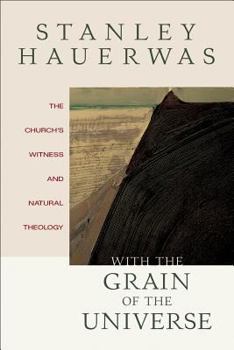With the Grain of the Universe
Select Format
Select Condition 
Book Overview
Explores how natural theology, divorced from a confessional doctrine of God, inevitably distorts our understanding of God's character & the world in which we live. This description may be from another edition of this product.
Format:Paperback
Language:English
ISBN:0801048982
ISBN13:9780801048982
Release Date:June 2013
Publisher:Baker Academic
Length:266 Pages
Weight:0.82 lbs.
Dimensions:0.6" x 6.0" x 9.0"
Age Range:18 years and up
Customer Reviews
2 ratings
The sense of theology
Published by Thriftbooks.com User , 15 years ago
Almost anything written by Stanley Hauerwas is worth reading - even if only to disagree with him. He is always demanding of his reader (or audience), as he is of himself, confronting them, challenging them, to look deeply and truthfully into their own hearts and minds. It is typical of him to cast aside tradition in doing the esteemed Gifford lectures, and instead do what he feels is right. He is courageous in taking on the thinking of these three men, and speaking his mind openly, without even at glance toward political correctness. He engenders respect, if not agreement. The review "What nonsense is theology" is particularly poor, and should be dismissed out-of-hand. It is not a review of this book at all, but merely a diatribe about the reviewer's own pet peeves. It does NOT address the book.
Will it be James, Niebuhr, or Barth?
Published by Thriftbooks.com User , 22 years ago
The publication of Stanley Hauerwas' Gifford lectures (2000-2001) is an account of what went wrong with theology in the nineteenth century and how to set it back on the right course. The author exemplifies the former with an examination of William James and Reinhold Neibuhr and presents them as "disguised forms of humanism." The right course for our particular circumstance is a recovery of Karl Barth's christological natural theology.I have little quarrel with Hauerwas' picture of James but I am troubled by his treatment of Niebuhr. The difficulty begins with the author's opening statement about Niebuhr: "Sin! Not just sin, but original sin, is taken to be what distinguishes Niebuhr from Protestant liberalism." In a way that is unthinkable for James, Niebuhr has a theology and it is driven by the reality of sin. In spite of some broad similarities between James and Niebuhr, their pragmatism for example, Niebuhr lived an authentic form of Christian witness. One does not even have to go beyond what the author writes about Niebuhr to see that Niebuhr's theology is thoroughly "against the grain" in a way that James' spiritualism is fashionable. It is peculiar, to say the least, that Barth is presented as an example of natural theology because of his adamant "no" to any form of natural theology. In order to make his argument, Hauerwas has to redefine what is meant by natural theology. It has nothing to do with the natural world and everything to do with Barth's "ability to tell us the way the world is." Immediately, some will be dissatisfied with the Barthian divorce between natural science and theology. It is unfortunate that Hauerwas flows with the grain and turns Christian faith further inward without regard to a Christian witness over against the dominant and reductive scientific description of the way the universe is. The vitality and relevance of "With the Grain of the Universe" is the question about whether it should be James, Niebuhr, or Barth who inform our theology. I do not like the forced choice between Niebuhr's inclusive form of witnessing (social justice, building coalitions, changing laws, siding with the poor) and Barth's witness to the crucified and risen Lord. If Christian theology is going to embrace natural theology, then let it be as Hauerwas says, a confident and unapologetic proclamation of the way things, but as a witness broad enough to include the created order as well as the human soul. As usual, Stanley Hauerwas has provided a theological framework for a lively and meaningful conversation.





